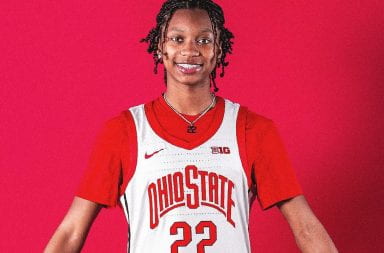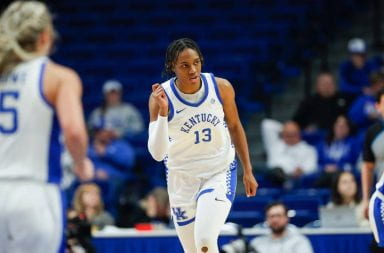It doesn’t take long to realize when senior Paloma Escobedo steps onto the tennis court. Within seconds of the first serve, you can hear Escobedo’s voice, shouting and hissing a mix of Spanish, English and the occasional curse.
“Vámonos! Let’s go!” Escobedo shouted, zooming a return past Wisconsin’s Jenny Hois.
It was Escobedo’s first tennis match in more than a month, and she’d been itching for her return to the court. When she went down with a stress fracture in her left leg on March 11, she was forced to watch her team hit the home stretch of its season without her.
“At the beginning, it was really hard mentally and physically,” Escobedo said. “Sitting through practice was exhausting. I wanted to be out there.”
She returned to the court for the final two home matches of the season and the senior captain put her struggles into perspective. When she saw someone in a wheelchair, Escobedo said, she quit feeling sorry for herself.
“It was a learning experience,” she said. “As time went on, I started to mature, in a way, because I started to accept it. I started thinking, ‘Things could be a lot worse. It was a bad deal that it was my senior year, but I’m a healthy girl and I should be thankful.'”
When Escobedo went down, the women’s tennis team lost its No. 1 singles player. Alone, she has accounted for 65 total wins, with an additional 78 wins in doubles play. But with the loss of its captain, the team gained its most vocal cheerleader.
“I make it a big deal to have the positive energy transfer to every court,” Escobedo said. “This is my job; I’m the juicer. Sometimes we get nervous, and it helps to have a good captain. It shows how strong our team is.”
Coach Chuck Merzbacher said he knows how valuable Escobedo was to his team, both on and off the court.
“She gets it,” he said. “She knows if she can’t be on the court … she’s going to cheer them on. She’s going to help every kid out and just be a good leader. She’s stepped up by being real helpful and keeping everyone going.”
Escobedo said when she was unable to play, she had to find an alternative way to help her team.
“Even when I’m not playing, I’m the loudest person,” she said. “Even when I’m not playing, I know I annoy the other team. … I’m proud of that. I try to show who’s boss when I’m on the court.”
Despite a fiery effort, Escobedo’s return to the court ended with a loss. But her frustration was short-lived. Within minutes, she was with her teammates again, screaming at the top of her lungs. After the match, she was calm and collected.
“I had a lot of fun out there, even though I lost,” she said. “I saw what I needed to work on still. It was just really nice to be out there. I was really just happy to be able to play tennis again, to be able to play competitive tennis and matches. I think that it’s just going to get better from here on out.”
It’s this Jekyll-and-Hyde behavior that defines Escobedo. On the court, her passion and spirit make her a daunting opponent. Off the court, the same qualities define her as an individual and teammate.
The significance of her return to the court can’t be measured simply in wins. For Escobedo, the journey has been worthwhile.
“It has been the most memorable, enjoyable experience,” she said. “I’ve been very lucky and very blessed to have this opportunity. … I’ve had the best four years. It went by way too fast.”
Following OSU’s victory against Minnesota on Senior Day, a tearful Escobedo stood side by side with her teammates in the same fashion she had since her first days as a Buckeye.
In front of her stood Merzbacher, equally emotional, if not more so. Beside her, teammates cried and laughed with her.
“Everyone gets along with her, everyone appreciates her and everyone has enjoyed her as a teammate,” Merzbacher said. “I think that’s more important than anything. They just want her to end on a good note.”


